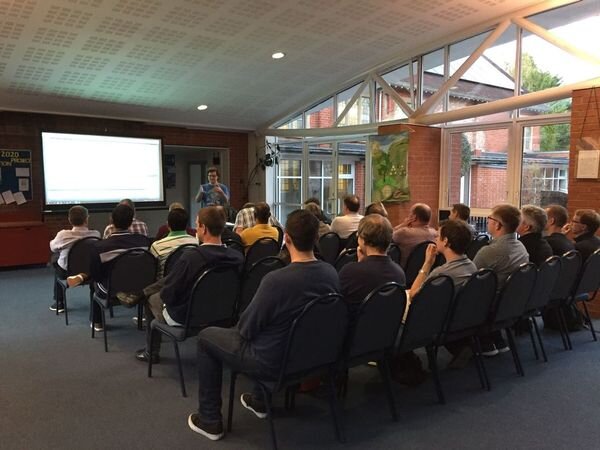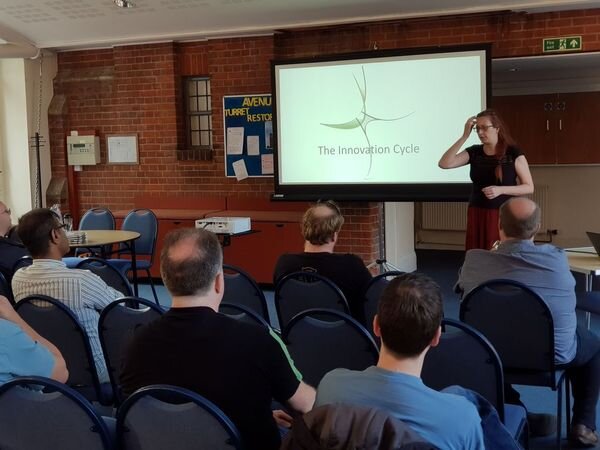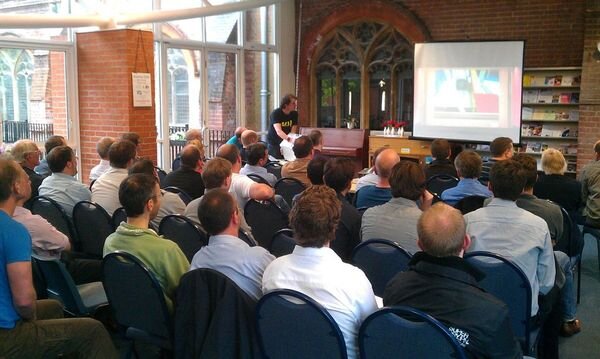How To Run A Successful Developer Meetup Group For Over A Decade
Co-organiser and Software Developer Steve Richmond discusses how the Developer South Coast group has attracted a stellar line-up of speakers for 13 years, and how it has weathered the pandemic.
Not only has developer group Developer South Coast been running regularly for 13 years now, even the Covid storm couldn't disrupt its monthly meetings.
Successfully translating its meetings to Zoom, and gathering new international members in the process (which add up to a cohort of almost 1,000 members from past and present), Developer South Coast has seen the likes of Jon Skeet (the biggest contributor to C# on Stack Overflow) and Troy Hunt (the creator of website Have I Been Pwned and well-known web security expert) speak at its meetups in Southampton.
We sat down with our own Steve Richmond, who is also one of the co-organisers of the group, to find out what it takes to host a thriving Meetup group and line up quality speakers.


Tell me how it started?
Two chaps, Richard and John, started it 13 years ago. At that time it wasn’t involved with Meetup, and was called Nxtgn User Groups. After about six years, it moved to Meetup.com but the format has always been the same. We meet up in Southampton on the third Thursday every month, 7-9pm, and we generally have one main speaker for an hour and a half. We have a break in the middle for pizza and networking, and at the end we do a raffle for some swag from our sponsors.
About 18 months ago, Richard and John wanted to step back and that was fair as they’d been doing it for such a long time. There was a shortlist whittled down to three of us to carry on organising it, and I’m mainly responsible for lining up the speakers.
When did you join the group?
I joined around 9 or 10 years ago when I used to live over in Christchurch. I live in Dorchester now, and carried on but it can be a bit of a trek to get over there!
Over these 9 or 10 years, how have you seen the group change?
There’s a certain turnover of members over the years of course. It’s mainly developers and we do get a handful of students. When we were previously charging a membership fee, we reduced the fees for students or anyone who were unemployed. We were mainly professionals and are a mix of people in full-time jobs and contractors. We have new graduates and we have one chap who is retired! The makeup of the group hasn’t changed much over the years. We have probably shifted more towards web and cloud development talks over the years though, reflecting changes in development trends.
Can you tell me a bit about the speakers?
The quality of speakers have been excellent and have included international speakers. They’ve mainly been .Net-centric but we’ve also had speakers on JavaScript, functional programming and more process-type talks such as agile. In the next couple of months, we will have a talk about team topologies and organisational habits. It’s quite a lot of web development, but we have also covered the cloud, desktop and mobile development.

What has it been like for you lining up the speakers?
Lining up the speakers can be tricky! It’s a bit like a sales job almost! You can approach loads of people and get either no response, or ‘sorry we can’t do it’, and then finally hit a run with people who can do the talk. You’ve got to think what’s in it for people to travel down to Southampton for a talk as we don’t pay the speakers, though sometimes we pay travel expenses. There are a lot of people out there looking to establish themselves as speakers on the Meetup or conference circuit. In the run-up to conferences, they may want to do conference talks before the main event, and it’s a good opportunity for them to practice in front of a small audience.
We didn’t actually miss any meetings when the first lockdown began last Spring as we switched straight over to Zoom. And that actually makes it a lot easier as you’re not geographically constrained and we’ve had a couple of good speakers from the States in that time. We’ve also got a guy from Canada in May. We’ve gained members from all over the country and abroad as well. It does mean that when we go back to live meetings hopefully later on in the year, we’ll have to look at how we can accommodate them. This might be where we have some of our meetings stay virtual, or live stream our meetings from Southampton - I think we’ll probably try and do that!
How big was the group before Covid?
We tend to get around 30 at each event, and we’ve got 940 members in total according to Meetup which will include members from over the years. It’s really a testament to Richard and John who started it, as they have great connections within the developer community. Over the years, a group tried to start up in Bournemouth and one in Dorchester, but both eventually fizzled out. These types of developer groups are quite difficult to actually keep going. We have a good sponsor too called Spectrum IT, and they’ve been very good to us, as well as some of our other sponsors. We try to not be entirely dependent on sponsorships, as other groups were dependent on one single company and when the company stopped sponsoring for whatever reason, the group folded. Prior to lockdown, we did have a membership fee to ensure our independence, which covers our hire of the hall and the pizzas. We currently don’t have that and Spectrum covers our Zoom costs.
Do you think there are any other elements that have contributed to the success of the group?
I think it’s because of how involved Richard and John were. They went to local meetings and developer conferences, so had great connections for publicising the group and gaining speakers. We’ve found that Meetup has been a good forum for people to find us too, or through word of mouth.
For gaining speakers, we look at what other big developer groups in the country are doing, and look up their speakers’ profiles on LinkedIn or Twitter etc to get their contact details. You can also look them up on conference website to see who’s speaking and their topics. There are also podcasts and I listen to quite a few developer podcasts, and you can identify potential speakers from that. We’ll also keep a lookout on Twitter to see if anyone is offering to do a talk.
To keep it going, you have to keep getting good-quality speakers. If you’ve got a high-profile speaker, you’ll get a big attendance at the meeting too.
Who have been your favourite speakers?
We’ve had some great recurring speakers. Mark Rendle has spoken to us three or four times, he’s a very good speaker. I think he tried to have a side career as a comedian a few years ago! We’ve also had Jon Skeet, who is the biggest contributor to C# questions on Stack Overflow, so he’s very well known in the community. He talked to us at least twice, and he’s probably due to speak again actually! He’s very good. We’ve also had Troy Hunt, who is very well known in web security (and is the creator of Have I Been Pwned). He’s from Australia and it coincided with a visit he was doing over here! A couple of months ago, we had Richard Campbell, who is a co-host of the .Net Rocks podcast.
We try to keep the quality of speakers high, as well as encourage local speakers to have a go. We have a 10-minute start at the beginning of each meeting, which we call a nugget, for someone to talk about anything. It could be about some programming problems, new technology they’ve found, or even a programming book they’ve read. It’s a slot for someone who may not have done a talk before to have a go! I did one two or three years ago.
How did you find it?
It was nervewracking and quite difficult trying to fit something into ten minutes! Some people who have done them have ended up running over, but we try not to encourage that as it could eat into the main event. I enjoyed it though and it was great! In the meeting after, someone came up to me to say that the thing I was talking about, they had started to use it in their work, so that was nice!
We are thinking about doing a series of 20-minute talks for our members to give, but we need to drive up interest first. That is something we hope to do!
You can stay up to date with all of Developer South Coast’s latest events by heading to their dedicated Meetup page.


